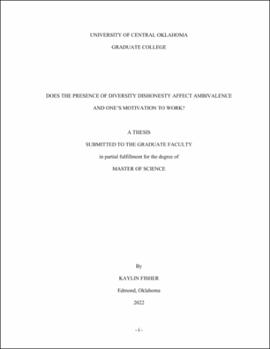| dc.contributor.advisor | Horner, Margaret | |
| dc.contributor.author | Fisher, Kaylin | |
| dc.date.accessioned | 2022-07-21T14:22:18Z | |
| dc.date.available | 2022-07-21T14:22:18Z | |
| dc.date.issued | 2022 | |
| dc.identifier.other | (AlmaMMSId)9982871209602196 | |
| dc.identifier.uri | https://hdl.handle.net/11244/335949 | |
| dc.description.abstract | Diversity dishonesty is the belief that an organization has inflated its real value of diversity, which can have a significant impact on individual perceptions of company practices. This study sought to assess whether the presence of diversity dishonesty affected ambivalence and motivation to work for a company. Previous research findings reported participants expressing ambivalence towards diversely dishonest companies (Wilton, Bell, Vahradyan, & Kaiser, 2020). A similar relationship between diversity dishonesty and ambivalence was expected. The present study attempted to find this effect by measuring cognitive and affective evaluations to assess individual ambivalence, and by using a motivation scale. The purpose of this study was to replicate previous diversity dishonesty research and extend it by accounting for ambivalence and motivation. These goals were accomplished by measuring participant responses to a modified company advertisement. Participants for this study were recruited through the undergraduate Psychology program at the University of Central Oklahoma (n =194). Participants were randomly assigned to either a diversity dishonest condition or a control condition and were then asked to evaluate their own cognitive/affective evaluations and motivation toward the job as if they were being hired by the organization. This study predicted that the presence of diversity dishonesty would be predictive of ambivalent attitudes towards the workplace and that this in-turn would negatively affect motivation. Results suggested that although the experimental condition was unrelated to ambivalence or motivation, participants’ decision regarding whether or not to work for the company was significantly related to ambivalence. The hypotheses of this study were not supported. This study highlights the complexity of participant attitudes toward diversity in the workplace and indicates how this affects the workplace’s perceived eligibility as an employer. Future research that evaluates public perceptions of as well as acceptance of tolerable workplaces, particularly in conjunction with dishonest environments, is essential to understanding which factors affect employee perceptions of diversity dishonesty and how this can affect motivation and retention within the organization. Additionally, further research examining diversity and equity perceptions would better inform programs, companies, and the general public about the impact a culturally dishonest environment can have on public. | en_US |
| dc.rights | All rights reserved by the author, who has granted UCO Chambers Library the non-exclusive right to share this material in its online repositories. Contact UCO Chambers Library's Digital Initiatives Working Group at diwg@uco.edu for the permission policy on the use, reproduction or distribution of this material. | |
| dc.subject.lcsh | Employee motivation | |
| dc.subject.lcsh | Employees | |
| dc.subject.lcsh | Diversity in the workplace | |
| dc.subject.lcsh | Honesty | |
| dc.subject.lcsh | Corporate image | |
| dc.subject.lcsh | Attitudes | |
| dc.title | Does the presence of diversity dishonesty affect ambivalence and one's motivation to work? | en_US |
| dc.type | Academic theses | |
| dc.contributor.committeeMember | Archuleta, Kristi | |
| dc.contributor.committeeMember | Limke-McLean, Alicia | |
| dc.thesis.degree | M.S., Psychology | |
| dc.subject.keywords | Equity perceptions | |
| dc.subject.keywords | Diversity dishonesty | |
| dc.subject.keywords | Motivation | |
| dc.subject.keywords | Tolerable workplaces | |
| dc.subject.keywords | Occupational psychology | |
| dc.identifier.oclc | (OCoLC)1336920168 | |
| thesis.degree.grantor | Jackson College of Graduate Studies | |
